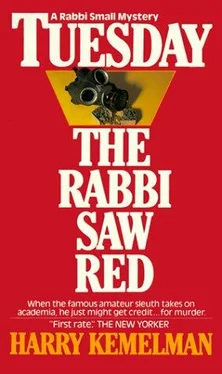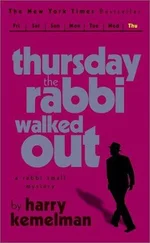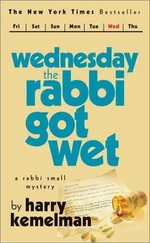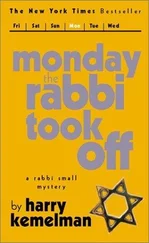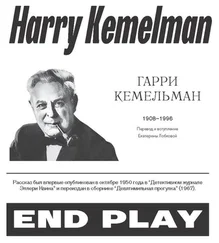He looked around the room. "Which brings us to Mr. Mazelman's questions and its larger implication: Is it our duty as Jews to be the leaders in all reform movements? I suppose we have a tendency in that direction as a result of our history. But there is nothing in our religion or basic tradition that imposes this duty on us. It does not call for us to devote our lives, like the Knights of the Round Table, to righting wrongs."
The class was attentive now, the rabbi felt he had the situation in hand, so he continued with less vehemence. "Ours is a practical religion calling for a practical way of life, there are so many injustices throughout the world that if we set out to right them all, even if we could, when could we live our own lives? And can we always be sure that we are right? And that our method of reform will improve things? Even in the small matter of sitting on the floor there was a difference of opinion. I, for one, was not convinced either that President Macomber was wrong or that the method taken to convince him was right, and remember what I said about the difference between our kind of Chosenness and that of other nations. Our religion calls on us to live our own lives in rectitude and justice, not to impose them on anyone else."
"How about Israel then?" Henry Luftig called out. "Why aren't they treating the Arabs justly?"
"Compared to whom?" the rabbi shot back. "I don't understand. Rabbi."
"It's quite simple. Mr. Luftig,” he said. "We criticize Jews and Judaism by disparaging comparisons with some ideal. But to be fair, you must compare them with what's real, not imaginary. So I ask, what other nation has dealt with its foe better, or even as well, as has Israel with the Arabs?"
"What about the way the United States treated Germany and Japan?"
"But that was after they had signed a peace treaty; not while the other country still considered itself at war."
"Yeah, but everybody says they ought to be a lot less obstinate."
The rabbi smiled grimly. "There is also in our religion a doctrine against suicide."
"But the Palestinians were driven from their homes."
"They left their homes." Mark Leventhal called from across the room. Like Mazelman, he came from a traditional home and had had some religious schooling. "The Arabs promised they'd be able to return once they'd driven the Jews into the sea, they were promised the Jews' property as well."
"I don't believe it."
"Well it's true.
"Lillian Dushkin said in a high, shrill voice: "This boy I know told me there are lots of Jews in Israel who feel the Jews have no right to be there until the Messiah comes."
"Yah? So what are they doing there?"
And they were off again, but this time the rabbi made no effort to stop them, he sat on the edge of the desk and listened, vaguely annoyed, but occasionally interested in spite of himself, the bell rang at last and the class began to gather their books.
"Just a minute,” he called out, they halted.
"You seem to have a lot of questions more or less relating to the subject matter of this course. So I'm setting aside the next class. Friday, and perhaps succeeding Fridays, to deal with them. You can bring in any questions you like, and I'll do my best to answer them."
"You mean in writing?"
"In writing or orally, or write them on the blackboard for all I care."As he came down the broad granite steps of the administration building. Luftig and Shacter, lounging against the iron railing, fell in step with him as he made for the parking lot.
"That was quite a class today, Rabbi." said Luftig, his thin face aglow.
The rabbi looked at him. "You think so? You feel you learned something?"Luftig looked surprised— and hurt. "Why sure."
"What, for instance?"
"You mean specifically? Well, I didn't know there were Jews who thought they had to wait for the Messiah before they could live in Israel, and— and that business about the Arabs expecting to take over Jewish property, and— oh, lots of things."
"Well, that first, about the Messiah, that's wrong," the rabbi said. "The objection is not to living in Israel, but to establishing a state, as for the rest, if you want to hold a bull session why bother to come to college and pay tuition for it?"
"But this was fun. Rabbi." Shacter protested.
"It's not my function or the college's to amuse you,” he said stiffly.
As the rabbi drove off, Shacter said, "Gee, what's he so uptight about?"
In the short time that had elapsed since the incident, the Windemere folder had assumed sizeable proportions, there were photographs of the offices of Professor Hendryx and Dean Hanbury, as well as floor plans to show their relation to each other. Most of the folder, however, consisted of typed statements made by the various people questioned by Sergeant Schroeder.
He read over the statements now in preparation for his conference with the assistant district attorney, he had worked with Bradford Ames before and had great respect for him. When Ames prepared a case, nothing was left to chance. Schroeder smiled as he came to Dean Hanbury's statement:.. .The girl then said something insulting and I decided to leave.
QUERY: What did she say, Miss Hanbury?
ANSWER: I'd rather not repeat it. It was a four-letter word.
QUERY: Was it directed at you?
ANSWER: It was addressed to me. I'm not used to— I cannot tolerate that kind of language spoken to me by a snip of a— by a student. In any case, I decided that it was pointless to continue the discussion, so I said. "I must go now" and I left. I left the building and went to my car and drove home.
QUERY: And what time was that. Miss Hanbury?
ANSWER: About half-past three. If the exact time is important. I'm sure you can get it from the Barnard's Crossing police, because I called them almost as soon as I arrived home. I suppose they register all calls. You see, there was a window open—
QUERY: No, no, I'm interested in what time you left the meeting.
ANSWER: Well, it was scheduled for two-thirty, they were prompt. I'll say that for them, we talked for about ten or fifteen minutes when that girl—
QUERY: Yes. Miss Hanbury, then would you say it was two forty-five?
ANSWER: That's about right.
QUERY: Two forty-five to three-thirty, that's pretty fast time to Barnard's Crossing isn't it?
ANSWER: Well, traffic was light, and it may have been that I left as early as two-forty, are you going to charge me with speeding. Sergeant?
The four students in their statements differed markedly with the dean, and to some extent with each other, as to the reason for her departure, insisting that she had not really been offended but had used the remark as an excuse to break off the discussion. Judy Ballantine, who had precipitated the incident, naturally was most insistent that it was merely a ruse, Abner Selzer, on the other hand, was inclined to feel the dean may have been genuinely distressed. "You ought to see my mother when someone talks like that, especially a girl." He also confirmed the dean's time of departure.
ANSWER: It was a few minutes of three when we all got back to the office after looking for her because I looked at my watch and said we'd wait until three and then split. It must have taken us five or ten minutes to search the building, so that would mean she left between two-forty and ten of.
QUERY: And you all left at three?
ANSWER: That's right.
QUERY: Then what did you do?
ANSWER: Oh, we wandered down to the comer diner for a cup of coffee and to talk it over, and we just about got there when we heard this boom. So we ran out and saw smoke coming from the administration building. So naturally we ran back to take a look, and in a couple of minutes— Jeez, there's a whole mob and fire engines, we stood around for a while and then split.
Читать дальше
